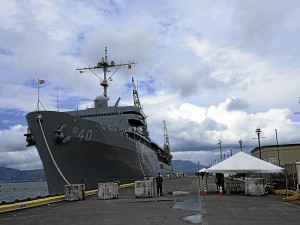
Olongapo Mayor James Gordon Jr. is given a tour by Captain Nelson Hildreth aboard the USS Frank Cable, a submarine tender, which docked in the Alava Pier of the Subic Bay Freeport last week. Photos by Robert Gonzaga
SUBIC BAY FREEPORT, Philippines – The United States Navy is reviewing the past performance of its contractor, Glenn Defense Marine Asia Philippines Inc., to determine if it violated ocean dumping laws which would also mean it violated its husbanding contract with the American naval agency.
“If it is proven that GDMA (Glenn Defense) violated any Philippine laws, codes, and/or regulations while performing the contract, then the Philippine government and its appropriate enforcing agency can choose to pursue appropriate actions against GDMA,” said Sky Laron, director of corporate communications at the NAVSUP Fleet Logistics Center of the US Navy based in Yokosuka, Japan.
“The US Navy remains committed stewards of the environment…. Should it be proven that GDMA has violated applicable regulations during the course of its disposition of domestic waste water and bilge water, then GDMA will have also violated the terms of the husbanding contract,” said Laron, who described Glenn Defense as “a private contractor” and not an agent of the US Navy.
Glenn Defense has been accused of dumping untreated waste it siphoned from US Navy vessels in Subic Bay in October, but its president, retired Vice Adm. Mateo Mayuga, said the firm treated the waste and dumped it outside Philippine waters as prescribed by Philippine and international marine environmental laws.
Glenn Defense describes itself in a statement as a Singaporean-based multinational firm, and not Malaysian as earlier reported. One of its key offices operates in Kota Kinabalu.
NAVSUP is the American naval agency that contracted Glenn Defense to handle waste disposal for its fleet in the Asia Pacific region.
The e-mail exchange between Laron and the Inquirer was facilitated by the US Embassy in Manila, after its deputy press attache, Cynthia Cook, said that American naval authorities had started their own investigation.
The NAVSUP Fleet Logistics Center in Yokosuka is the Western Pacific region’s largest US Navy logistics command, according to the US Navy Web site.
In his letter, Laron said, “As with any violation, the US Navy has the normal contractual remedies, to include adverse past performance report and consideration of revocation of acceptance for the services that were rendered.”
In a statement posted on the Philippine Coast Guard’s Web site, Rear Adm. Luis Tuason Jr., Coast Guard officer-in-charge and vice commandant for operations, said that there are 10 areas in the country where ocean dumping is permitted “under certain conditions and specifications of waste… [that is] allowed to be discharged.”
Tuason said that any vessel engaged in managing waste should first secure a permit from the Coast Guard before it dumps or discharges waste into the sea. But Tuason said that since January, “we haven’t received any application for dumping permit from Glenn Defense Marine Asia Inc.”
Glenn Defense officials claimed one of its ships dumped its waste cargo in October at least 17 nautical miles off Subic Bay. In the statement, Tuason observed that a transfer of waste from a US Navy ship to the support vessel, M/T Glenn Guardian, took place, but Glenn Defense “failed to notify the Coast Guard that they [would] perform a waste transfer from the navy ship to its support vessel.”